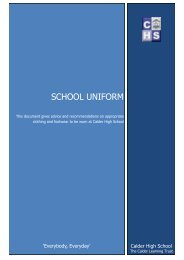Target Setting, Assessment, Tracking Pupil Progress & Reporting
Target Setting, Assessment, Tracking Pupil Progress & Reporting
Target Setting, Assessment, Tracking Pupil Progress & Reporting
Create successful ePaper yourself
Turn your PDF publications into a flip-book with our unique Google optimized e-Paper software.
<strong>Assessment</strong><br />
Regular and accurate assessment informs the tracking and<br />
reporting process.<br />
At Calder High School embedding assessment for learning is high on<br />
the raising achievement agenda.<br />
The <strong>Assessment</strong> Reform Group has defined <strong>Assessment</strong> for Learning<br />
as ‘the process of seeking and interpreting evidence for use by<br />
learners and their teachers to decide where the learners are in their<br />
learning, where they need to go and how best to get there’.<br />
(<strong>Assessment</strong> for Learning: 10 principles, <strong>Assessment</strong> Reform Group, 2002, available in the<br />
publications section of the website, www.assessment-reformgroup.org/)<br />
‘<strong>Assessment</strong> for Learning is a powerful way of raising pupils’<br />
achievement. It is based on the principle that pupils will improve<br />
most if they understand the aim of their learning, where they are in<br />
relation to this aim and how they can achieve the aim (or close the<br />
gap in their knowledge). It is not an add-on or a project; it is<br />
central to effective teaching and learning.’<br />
(<strong>Assessment</strong> for Learning Strategy, Ref: DCSF-00341-2008)<br />
It is the expectation that teachers continually assess pupil progress<br />
using assessment for learning strategies in lessons. In this way,<br />
teachers will pick up misconceptions, differentiate and reshape<br />
tasks thus enhancing pupil progress.<br />
Marking<br />
Teachers are responsible for assessing pupil progress shown in the<br />
work their pupils produce. It is the expectation that class work and<br />
ILT / homework is marked regularly. <strong>Pupil</strong>s will be formally<br />
assessed to National Curriculum level or GCSE/ AS/A2 grades every<br />
6 weeks. It is understood marking will vary across faculty areas<br />
depending on the nature of the subject. However, there are certain<br />
principles that will underpin all marking within school. Marking on<br />
pupil work in exercise books and formally assessed pieces of work<br />
will follow these guiding principles:<br />
1. Areas of success will be indicated and there will be a positive<br />
comment indicating what has been done well.<br />
2. The learning outcomes of each piece of work will be made<br />
explicit to pupils. Marking will be carried out against these<br />
criteria and indicate the extent to which pupils have been<br />
successful in meeting them.<br />
5


